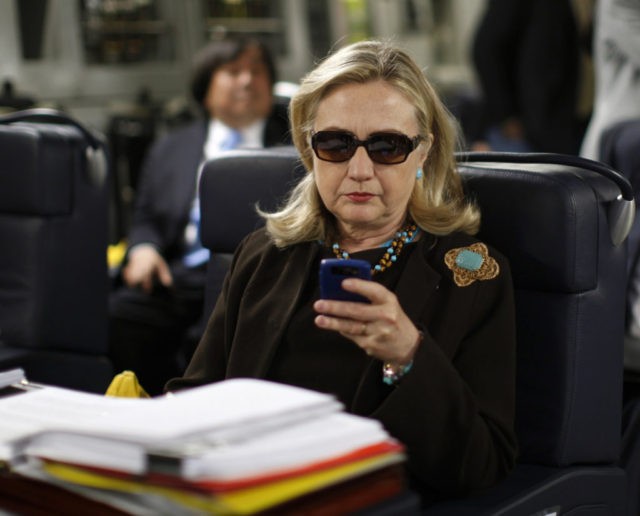Way too slowly, but surely, the government is revealing, under our pressure, what it knows about Hillary Clinton’s scandalous misuse of email.
Last week United States District Judge James E. Boasberg ruled that the Department of State must make public a FBI declaration detailing its efforts to retrieve the former secretary of state’s government emails (Judicial Watch, Inc. v. Rex Tillerson (No. 1:15-cv-00785)).
I issued this statement regarding the decision:
We’re happy with the ruling but it is unbelievable we’re being opposed by Trump appointees in the State and Justice Departments on the Clinton email issue. President Trump ought to be outraged his appointees are protecting Hillary Clinton. The State Department should initiate action with the Justice Department – and both agencies should finally take the necessary steps to recover all the government emails Hillary Clinton unlawfully removed.
Here is the background.
On April 30, 2015, we sued former Secretary John Kerry after the State Department failed to take action on a letter we sent to Kerry “notifying him of the unlawful removal of the Clinton emails and requesting that he initiate enforcement action pursuant to the [Federal Records Act],” including working through the Attorney General to recover the emails.
After initially being dismissed by the district court, our lawsuit was revived on appeal by the U.S. Court of Appeals for the District of Columbia Circuit on December 27, 2016. The Federal Records Act states that an agency head “shall” initiate an action through the Attorney General when he becomes aware of any unlawful removal of agency records.
While at the State Department, Clinton conducted official government business using an unsecure email server and email accounts. Her top aides and advisors also used non-“state.gov” email accounts to conduct official business.
The Trump administration defended the handling of the email matter by the Obama administration and filed two declarations from the FBI trying to justify the State Department’s refusal to follow the law and refer the Clinton email issue to the Justice Department.
As the decision notes, the second FBI declaration is non-public and was filed in camera and ex parte with the court. Judge Boasburg rejected the State Department’s arguments that the FBI declaration be withheld to protect grand jury secrecy: “After reviewing the document in camera, the Court concludes it largely rehashes information already made public, thus obviating any need for secrecy.”
Meantime, transcripts reviewed by the Senate Judiciary Committee reveal that former FBI Director James Comey began drafting an exoneration statement in the Clinton email investigation before the FBI had interviewed key witnesses.
Chairman Chuck Grassley and Senator Lindsey Graham, chairman of the Judiciary Subcommittee on Crime and Terrorism, requested all records relating to the drafting of the statement as the committee continues to review the circumstances surrounding Comey’s removal from the Bureau.
The senators wrote to the FBI: “Conclusion first, fact-gathering second—that’s no way to run an investigation. The FBI should be held to a higher standard than that, especially in a matter of such great public interest and controversy.”
Last week’s confirming revelations that Mueller conducted a sham investigation should spur President Trump, in the least, to order the Justice Department to review the handling of the Clinton investigations.
(We’ve done some significant media on the topic last week. I appeared with Tucker Carlson last night on Fox and will be on the Hannity program tonight and Fox & Friends tomorrow morning (Saturday). You can view most of JW’s tv media appearances on our YouTube channel at https://www.youtube.com/user/JudicialWatch )
No matter what the administration does, you can see that the Clinton email scandal is far from over – and Judicial Watch will continue to take the lead in advocating for accountability and the rule of law.

COMMENTS
Please let us know if you're having issues with commenting.